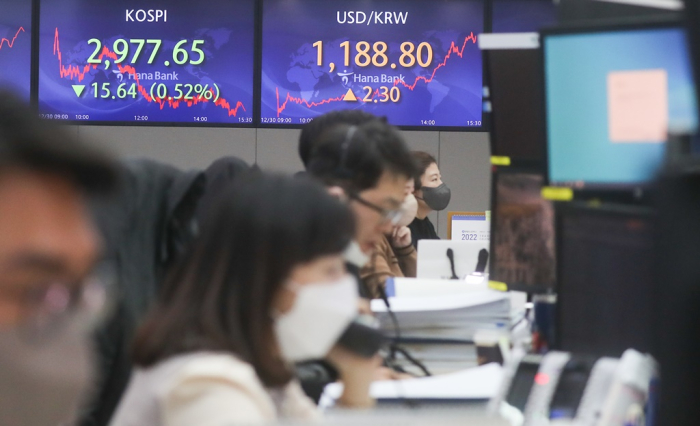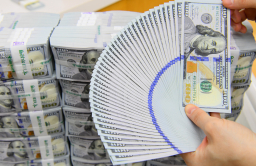-
KOSPI 2577.27 -2.21 -0.09%
-
KOSDAQ 722.52 -7.07 -0.97%
-
KOSPI200 341.49 +0.02 +0.01%
-
USD/KRW 1396 -2.00 0.14%
Foreigners’ Korean stockholdings soar 180-fold in 30 years
Markets
Foreigners’ Korean stockholdings soar 180-fold in 30 years
Improve market system, corporate governance; threaten management control
By
Dec 31, 2021 (Gmt+09:00)
3
Min read
News+

Foreign investors ramped up their holdings of South Korean stocks 180 times in 30 years, increasing influence in the local financial markets and domestic corporate managements.
South Korean shares became global in 1992 when the government allowed foreigners to invest in the local stock market.
On Jan. 3, 1992, the first trading day of the year, 512 names out of the total 766 stocks listed ended at the daily upper limit, pushing up the stock market index by 2.2%. Foreign investors placed orders to buy 106 billion won ($89.3 million) on the day, although they were able to purchase only 6.9 billion won due to regulations to cap their investment.
That was the beginning of foreigners’ stock investment in South Korea. The next year marks the 30th year of their investment in Asia’s fourth-largest economy.
JACK UP STOCK HOLDINGS
Foreigners held 4.1 trillion won in Seoul shares, 4.9% of the total market capitalization, as of the end-1992. The holdings surged to 764.3 trillion won, 31.4% of the market capitalization, last year. As of the end-November this year, their holdings declined to 734.1 trillion won, 28.3% of the total.
They have been tightening their grip on the local financial markets for three decades. Foreigners sold a net 30 trillion won worth of shares in the first 11 months, hurting the overall stock markets, due to concerns over weakening key local industries such as the semiconductor and the slowing Chinese economy.
South Korea’s financial regulators keep an eye on foreign investors’ activities. The authorities introduced a rule to require foreigners and foreign corporations that have been in the country for less than six months to register their information with the Financial Supervisory Service for stock trading in 1992 when the nation opened the capital market.
The regulation is aimed at checking the local stock markets and managing foreign investment limits. MSCI Inc., formerly known as Morgan Stanley Capital International, cited the rule as one of the reasons not to include South Korea in its developed market index, however, suggesting the regulation is a barrier to foreigners’ investment.
The country limits foreigners’ holdings of stocks in some companies such as Korea Electric Power Corp. (KEPCO) to protect core industries, although the government gradually relaxed the regulations. In 1998, the nation removed the cap for general corporations at the request of the International Monetary Fund.
Despite the limit, foreigners had loved KEPCO in the 1990s. Their top pick was the state-run utility company in 1998 with a net purchase of 1.3 trillion won, according to available data. In 1998, KEPCO was the largest company by market capitalization, but the company is not even in the top 20 currently.

IMPROVE MARKET SYSTEM, CORPORATE GOVERNANCE
Foreign investors improved the domestic stock markets and corporate governance while threatening local companies’ management rights.
“Foreign sometimes threatened management controls and exploited loopholes in regulations, but they often contributed to improvement in corporate governance,” said Kwangwoo Park, Korean Securities Association’s president.
In the early 2000s, Monaco-based Sovereign Asset Management bought a 14.99% stake in SK Corp. and jeopardized the group’s management control, for example. But that caused South Korean conglomerates to rush for the reorganization of their governance structures.
Foreigners absorbed undervalued stocks with low price-to-earnings ratios, teaching advanced investment techniques to local investors. In addition, authorities enhanced stock market-related regulations such as rules on disclosures to a global level with growing foreign investment.
On the other hand, foreign investors dumped local stocks whenever the global financial market suffered from a liquidity crisis. Such selloffs bolstered dollar demand for repatriation, hitting the country’s currency market.
Foreign selling in the local stocks weighed on the markets this year, South Korea’s retail investors looked for overseas shares. Individual investors in the country held $79 billion in foreign stocks in November, 5.4 times more than two years ago when the COVID-19 has not hit the world, according to the Korea Securities Depository (KSD).
Write to Eun-Seo Koo at koo@hankyung.com
Jongwoo Cheon edited this article.
More To Read
-
 Overseas investmentsS.Koreans' global stock, bond holdings at record high
Overseas investmentsS.Koreans' global stock, bond holdings at record highOct 15, 2021 (Gmt+09:00)


